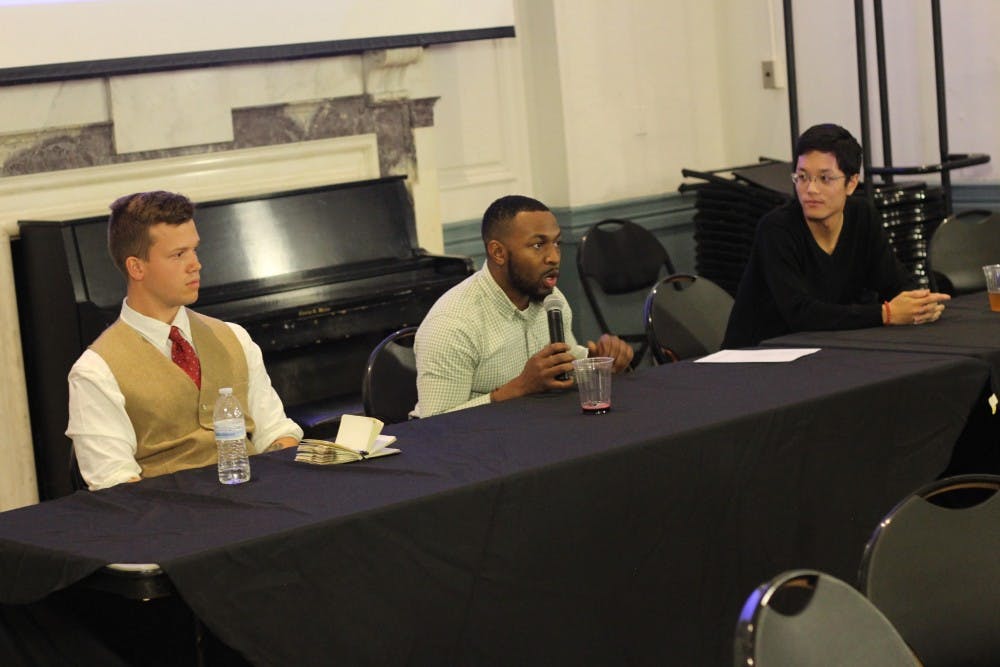Community Conversations, an organization that holds discussions with Hopkins and Baltimore community members, hosted a panel of alumni involved in outreach. They discussed the relationship between Hopkins and Baltimore on Monday.
Junior Chijioke Oranye, who helped organize the event, described how his experience as a Baltimore native inspired the discussion.
“You can’t walk 10 blocks in Maryland without seeing a Hopkins sign,” he said. “Why was it so distant from my life until I came to this school?”
The panel consisted of three recent graduates: Aaron Chang, a graduate student in biomedical engineering; Lance McCoy, a middle school math teacher and adjunct professor; and William Wisner-Carlson, an AmeriCorps member at a Baltimore-based nonprofit.
All three alumni were involved in social concern groups during their time at Hopkins. McCoy was the vice president of the Black Student Union. Wisner-Carlson participated in Baltimore First, a student organization that connects students with community projects. Chang co-founded Thread, a group that allows Hopkins undergraduates to mentor struggling Baltimore students.
All panelists agreed that the University’s relationship with Baltimore has not been strictly positive. They said that some residents mistrust the University, especially its research facilities.
Wisner-Carlson specifically cited instances such as the Hospital taking cells from cervical cancer patient Henrietta Lacks without her consent.
“Hopkins has definitely come a long way in terms of getting into these communities... in a more transparent way,” he said. “We still have a long way to go.”
Lance agreed with Wisner-Carlson and believes that when Hopkins begins a service project, it should focus on how that project will benefit the community, rather than how the University might profit.
“It’s like ‘alright, we want to do this project, but how much money are we going to make off of it,’ or ‘how are we going to get something back from it,’” he said. “I have to criticize it and see how we can make it better for all people.”
The discussion then expanded on the ways the University can improve its service projects. Chang felt that Hopkins community members should adopt a different perspective on the relationship between Hopkins and Baltimore.
“The relationship really has to start with people from Hopkins... recognizing the dignity of being able to work with fellow community members, seeing people in Baltimore in that light, learning from them.”
Similarly, Wisner-Carlson suggested that activists should be more willing to adjust their plans to what the community needs. He believes that although research and literature on the issues Baltimore faces can be helpful, there are some things one can only learn through first-hand experience.
Additionally, he emphasized that those who engage in community projects should view that as a long-term commitment. He noted that Baltimore citizens may be skeptical of students who volunteer in the City.
“A big concern that people have... is that [Hopkins community members] just swoop into the neighborhood, do a little something, and then they’re out,” he said.
Despite their criticisms, the panelists praised the University’s current programs that aim to improve the City. The panelists also highlighted the ways students can benefit from community involvement.
Chang believes that going out into Baltimore helps relieve stress and provides unique perspectives. To him, a Hopkins education is more than simply academics.
“Undergrads are putting themselves at a [disadvantage] when they just stick with the resources are presented on campus,” he said.
Wisner-Carlson elaborated that community involvement can provide students with valuable real-world experiences.
“When you’re in that situation, you develop perspectives that people don’t get when they’re doing some research and reading some books,” he said.
After the panel, the audience broke up into groups, which were tasked with identifying one problem with the Hopkins-Baltimore relationship and creating a plan to solve that problem.
The groups identified issues such as inconsistent service projects, mistrust of Hopkins and the University’s controversial history. Some groups suggested that Hopkins map out where its organizations are currently working in order to see what places are being overlooked.
Others wanted to create more communication between Hopkins and Baltimore so that the University can get more feedback to be an even more effective agent for change.





